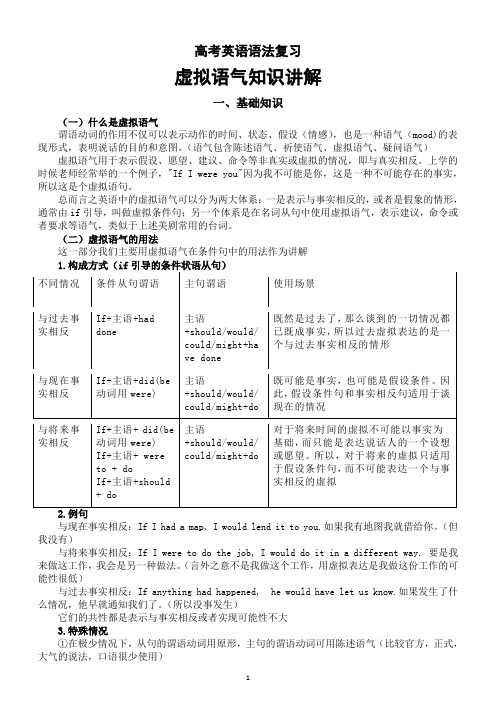高考语法(虚拟语气)
- 格式:doc
- 大小:83.05 KB
- 文档页数:10

高考英语语法复习虚拟语气知识讲解一、基础知识(一)什么是虚拟语气谓语动词的作用不仅可以表示动作的时间、状态、假设(情感),也是一种语气(mood)的表现形式,表明说话的目的和意图。
(语气包含陈述语气、祈使语气、虚拟语气、疑问语气)虚拟语气用于表示假设、愿望、建议、命令等非真实或虚拟的情况,即与真实相反。
上学的时候老师经常举的一个例子,"If I were you"因为我不可能是你,这是一种不可能存在的事实,所以这是个虚拟语句。
总而言之英语中的虚拟语气可以分为两大体系:一是表示与事实相反的,或者是假象的情形,通常由if引导,叫做虚拟条件句;另一个体系是在名词从句中使用虚拟语气,表示建议,命令或者要求等语气,类似于上述美剧常用的台词。
(二)虚拟语气的用法这一部分我们主要用虚拟语气在条件句中的用法作为讲解与现在事实相反:If I had a map, I would lend it to you.如果我有地图我就借给你。
(但我没有)与将来事实相反:If I were to do the job, I would do it in a different way. 要是我来做这工作,我会是另一种做法。
(言外之意不是我做这个工作,用虚拟表达是我做这份工作的可能性很低)与过去事实相反:If anything had happened, he would have let us know.如果发生了什么情况,他早就通知我们了。
(所以没事发生)它们的共性都是表示与事实相反或者实现可能性不大3.特殊情况①在极少情况下,从句的谓语动词用原形,主句的谓语动词可用陈述语气(比较官方,正式,大气的说法,口语很少使用)If that be the official view, it cannot be accepted.如果这是官方的看法,这是不能接受的。
②if可以省略,但是语序要改为倒装Were I Tom I would refuse.如果我是汤姆我会拒绝。


高考英语虚拟语气在英语中,虚拟语气是一种用来表达假设、想象、期望或建议的语言形式。
虚拟语气可以用来表达我们对于某些事情的看法或观点,而这些事情可能并不是真实的。
在高考英语中,虚拟语气是一个重要的语法点,需要考生们熟练掌握并运用。
一、虚拟语气的分类虚拟语气可以分为两类:现在虚拟语气和过去虚拟语气。
现在虚拟语气用于表达对于现在或未来的假设,而过去虚拟语气则用于表达对于过去的假设。
二、虚拟语气的构成虚拟语气的构成主要是通过谓语动词的变化来实现的。
在现在虚拟语气中,常用的谓语动词包括“would”、“could”、“should”、“might”等;在过去虚拟语气中,常用的谓语动词包括“would have done”、“could have done”、“should have done”、“might have done”等。
三、虚拟语气的使用场合虚拟语气通常用于表达主观的看法或建议,如表达对某件事情的遗憾、不满或期望。
在高考英语中,虚拟语气常常出现在完形填空、阅读理解、语法填空和写作等题型中。
四、虚拟语气的解题技巧1、理解语境:在理解题目语境的基础上,判断应该使用现在虚拟语气还是过去虚拟语气。
2、分析谓语动词:根据谓语动词的变化形式,判断应该使用哪个虚拟语气的形式。
3、关键词:在题目中寻找相关的关键词,如“如果”、“要是我”、“要是能”等,这些关键词通常会提示考生需要使用虚拟语气。
4、排除干扰项:在解题时,要排除那些与虚拟语气无关的选项,以免被干扰。
虚拟语气是高考英语中的一个重要考点,考生们需要熟练掌握其构成和用法。
只有在实际运用中多加练习,才能更好地理解和掌握这一语法点。
高考英语虚拟语气在英语中,虚拟语气是一种用来表达假设、想象、期望或建议的语言形式。
虚拟语气可以用来表达我们对于某些事情的看法或观点,而这些事情可能并不是真实的。
在高考英语中,虚拟语气是一个重要的语法点,需要考生们熟练掌握并运用。

虚拟语气虚拟语气表示说话人的主观愿望、猜测、建议或与事实不符的假设等,也可以表示可能性较小的情况或不可能发生的情况,而不是客观存在的事实(表示客观事实要用陈述语气)。
虚拟语气是由句中谓语动词的特殊形式表现出来的。
虚拟语气常用于复合句中,也可用于简单句。
比较:If she asks me tomorrow,I shall do it.如果她明天请求我,我会做的。
(陈述语气,说话人认为请求的可能性大)If she asked me tomorrow, I should do it. 假如她明天请求我,我会做的。
(虚拟语气,说话人认为请求的可能性小或不可能请求)1 虚拟语气的用法1-1 虚拟语气用于条件状语从句中1)表示与现在事实相反的情况If I were/was not busy today, I should go with you.如果我今天有空,我会同你一起去的。
If he were/was here,he might talk with you.如果他在这里,他可能会同你谈谈。
If I were you,I wouldn't accept her suggestion.如果我是你,我不会接受她的建议。
If I knew the answer to the question,I should/ would tell you.如果我知道问题的答案,我当然会告诉你。
If we left now, we should/would arrive there in time.如果我们现在就动身,我们会准时到达那里。
If he didn't do exercise every day,he wouldn't be so strong.如果他不每天锻炼,他不会那样强壮的。
If it weren't raining, we would go fishing.要是现在不下雨,我们就去钓鱼了。


高考英语语法虚拟语气练习题30题(带答案)1. If I ______ (be) you, I would study harder for the college entrance examination.A. amB. wasC. wereD. had been答案:C。
解析:在if引导的表示与现在事实相反的虚拟条件句中,be动词一律用were。
选项A是一般现在时,不符合虚拟语气的语法规则。
选项B虽然是be动词的过去式形式,但在这种虚拟语气结构中不能用was。
选项D是表示与过去事实相反的虚拟语气中的用法,与本题的现在事实相反的语境不符。
2. If he had known the result of the exam yesterday, he ______ (not be) so sad today.A. isn'tB. wasn'tC. wouldn't beD. hadn't been答案:C。
解析:这是一个混合虚拟语气的句子。
从句是与过去事实相反(had known),主句是与现在事实相反,在这种情况下,主句要用would + 动词原形,否定形式为wouldn't + 动词原形。
选项A 是一般现在时的否定形式,不符合语法规则。
选项B是一般过去时的否定形式,也不符合混合虚拟语气的要求。
选项D是与过去事实相反的虚拟语气中主句的用法,不适合这里与现在事实相反的情况。
3. If it ______ (rain) tomorrow, we would cancel the football match.A. rainsB. rainedC. will rainD. should rain答案:D。
解析:在if引导的表示与将来事实相反的虚拟条件句中,有三种形式:动词过去式、should + 动词原形、were to+动词原形。
选项A是一般现在时,用于表示将来的真实条件句,不符合虚拟语气规则。
高考英语虚拟语气一、虚拟条件句中的虚拟语气1、表示与现在事实相反的情况从句:If+主语+did (be动词用were)主句:主语+ should/would/might/ could + doIf I were you, I would take an umbrella.如果我是你,我会带把伞。
(事实:我不可能是你)If I knew his telephone number, I would tell you.如果我知道他的电话号码,我就会告诉你。
(事实:不知道)If there were no air or water, there would be no living things on the earth.如果没有水和空气,地球上就不会有生物。
(事实:地球上既有空气也有水)2、表示与过去事实相反的情况从句:If+主语+ had + done主句:主语+should/would/might/could+have doneIf I had got there earlier, I should/would have met her.如果我早到那儿,我就会见到她(事实:去晚了)。
If he had taken my advice, he would not have made such a mistake.如果他听我的劝告的话,就不会犯这样的错误了。
(事实:没有听我的话)3、表示与将来事实相反的情况从句:①if+主语+were to do②if+主语+should+do③if+主语+过去式(be动词用were)主句:主语+should/would/might/could+doIf he should come here tomorrow, I would talk to him.如果他明天来这儿的话,我就跟他谈谈。
(事实:不可能来)If there were a heavy snow next Sunday, we would go skating.如果下周日下大雪,我们就去滑冰。
高考虚拟语气的知识点高考是每个学生都经历的一段重要时光,考试的内容包罗万象,其中也包括了语法知识的考查。
虚拟语气作为语法知识的一部分,在考试中也常常出现。
虚拟语气是一种表示假设、愿望、建议等非真实情况的语气,它具有一定的规则和用法。
在本文中,我们将重点讨论,以帮助大家更好地应对考试。
一、虚拟语气的定义及分类虚拟语气是一种由于主观认识、推测、愿望、请求等因素产生的非真实语气。
根据表达的意思和语境,虚拟语气主要分为虚拟条件句、虚拟假设句和虚拟愿望句。
1. 虚拟条件句虚拟条件句表示与事实相反、与现实相反或不可实现的情况。
其中,与事实相反的虚拟条件句使用过去完成时的谓语动词,常常与if连用,表示对过去情况的推测和论述;与现实相反或不可实现的虚拟条件句使用过去将来时、过去时的谓语动词,与if连用,表示与现在或将来对立的情况。
2. 虚拟假设句虚拟假设句表示与事实相反、与现实相反或不可实现的条件假设。
其中,与事实相反的虚拟假设句使用“had”加动词过去分词的形式,表示过去某个时间的假设情况;与现实相反或不可实现的虚拟假设句使用“should”/“were to”/“would”等虚拟词,表示对现在、将来或永久性条件的假设情况。
3. 虚拟愿望句虚拟愿望句表示对现实情况的否定愿望或主观情感。
其中,非真实条件的虚拟愿望句常使用“wish”引导,后跟过去时的动词,表示对过去事实的否定愿望;对现在或将来的否定愿望使用过去时的动词或“would”引导;对现在或将来的否定愿望使用“were”或“would”等虚拟词引导。
二、虚拟语气的用法1. 表示假设虚拟语气经常用于表示假设的情况,例如:“如果我有更多时间,我会去旅行。
”在这个例句中,使用了虚拟语气来表达与事实相反的假设。
2. 表示愿望和建议虚拟语气也经常用于表达愿望和建议。
例如:“我希望我能参加明天的聚会。
”在这个例句中,使用了虚拟语气来表达对现实情况的愿望。
3. 表示要求和命令虚拟语气在表示要求和命令时也起到了重要作用。
第十六章虚拟语气一、考纲解读虚拟语气是高考热点,考生需要注意if条件从句中虚拟语气的用法、含蓄条件句中虚拟语气的用法和名词性从句中虚拟语气的用法;以及虚拟语气中倒装的出现;虚拟语气用于定语从句等。
二、考点精讲虚拟语气表示说话人所说的话不是事实,而是一种假设、愿望、怀疑或推测。
考点一虚拟语气在条件句中的用法If it were to rain tomorrow, I should not drive my car. 如果明天下雨的话,我就不开车了。
(明天的情况还不知道)If I had done it in time, I should have had a good time. 如果我及时做的话,日子就好过多了。
(可惜当时没能及时做)注意:1. 主句中的should通常用于第一人称,would可用于任何人称。
2. 条件句中如果动词是be,其过去式所有人称的单复数都可用were;在第一、三人称单数的口语中,可用was代替were。
但在if I were you中,不能说成if I was you。
3. 当条件从句的行为与主句所表示的行为所发生的时间不一致时,主从句中动词的形式要根据它所标示的时间作出相应的调整,这就是所谓的“错综条件虚拟语气”。
如:If they had studied hard, they could do it easily now.如果他们以前努力学习的话,现在干得就会容易些了。
If he had not taken my advice, he wouldn't do it much better like this.如果他不听我的建议,他就不会干得这么好了。
4.在条件句中,如果有were, had, should等,则可省略if,但应注意把were, had, should等提到从句主语之前。
如:If he were to come, I would join him in the discussion. =Were he to come, I would join him in the discussion. 如果他来,我将和他一道参加讨论。
5. 有些虚拟条件句没有从句,虚拟条件句是通过上下文或介词短语表示出来的。
如:But for air and water, there would be no life on the earth. 要是没有空气和水,地球上就没有生命。
(介词短语but for提供了虚拟条件)With your help, we might finish the plan earlier. 要是有你的帮助,我们就可以早些完成任务。
(介词短语with your help充当虚拟条件句)考点二虚拟语气在wish从句中的用法I wish I were a doctor. 我希望我是个医生就好了。
(现在)I wish that the rain would stop. 我希望雨能停下来。
(将来)I wish that he had not made so much fuss about it.我希望他不要把事情搞大了。
(过去)考点三虚拟语气在名词性从句中的使用1. 在insist;command,order;demand,request,require,desire;advise, propose, suggest,recommend等表示“命令、要求、建议”的动词后接的宾语从句中要使用虚拟语气。
如:He suggests that she (should) leave the house at once.他要她立刻离开这所房子。
He proposed that we (should) deal with the problem by the view of development.他建议我们应该用发展的眼光处理这个问题。
2. 与上述动词相对应的名词suggestion, order, demand , proposal 等后的表语从句、同位语从句中也要使用虚拟语气(should可省略)。
如:My proposal is that we (should) set a deadline for handing in the plan.我的建议是为这个计划设定一个上交的期限。
3. 在It be suggested (ordered, demanded, proposed, … )that… 结构中,主语从句中也要使用虚拟语气。
如:It's required that every student be on time for school. 要求每个学生准时到校。
4. 在do you suggest/recommend用在特殊疑问句中作插入语时,句子的动词也使用虚拟语气,即“should+动词原形”的形式,其中should可以省略。
如:What type of computer do you recommend/ suggest we (should) buy?你建议我们买什么类型的电脑呢?5. 在It's+necessary,essential,important, strange, natural等形容词+that从句或It's a pity,a shame等名词+that 从句中,谓语动词可以使用should do。
如:It is necessary that the badly wounded man should be treated immediately. 这位重伤员必须马上治疗。
It's a pity that you should be so careless.你竟然如此粗心,真是可惜。
考点四虚拟语气在状语从句中的用法在as if/though引导的状语从句中,谓语动词用过去式表示与现在相反的情况;用过去完成式,表示与过去相反的情况等。
其变化与wish后的宾语从句的变化相同。
如:I've loved you as if you were my relative.我一直爱你仿佛你是我的亲人。
考点五虚拟语气在其他一些句型中的用法1. It's high time that-从句中,谓语动词可以使用过去式,也可使用should+动词原形;表示“早该……了”,其中should不可省略。
如:It's high time we got up/should get up. 我们早该起床了。
2. would rather+从句中,谓语动词用过去式表示与现在或将来的情况相反;用过去完成式,表示与过去的情况相反。
如:I would rather you came tomorrow. 我宁愿你明天来。
3. if only…要是……多好啊。
如:If only you hadn't offended him. 你当时不惹他就好了。
If only he could come tomorrow. 他明天能来就好了。
4. 其他一些表示祝愿的句型。
如:May you succeed!祝你成功!Long live the People's Republic of China.中华人民共和国万岁!三、误区点拨1. 【误】The plant is dead. Maybe I should give more water.【正】The plant is dead. Maybe I should have given more water.【解析】根据第一句可知,植物已经死亡,所以应该是自责:本应该多浇些水的。
要用should have done形式表示“本应该做……而未做”。
2. 【误】Hadn't they saved us, we would have been drowned in the stormy river.【正】Had they not saved us, we would have been drowned in the stormy river.【正】If they had not saved us, we would have been drowned in the stormy river.【解析】当条件中含有were, had, should等时,可省略if,从而把were, had, should提到主语之前。
若条件句为否定句,则只把were, had, should提前,not仍放在主语之后。
3. 【误】If only I saw the film yesterday.【正】If only I had seen the film yesterday.【解析】if only后句子若表示过去的一种愿望,其谓语动词应用过去完成式,即if only sb. had done sth. 。
四、实战演练第一组1. 【2012湖南卷】Sorry, I am too busy now. If I ____ time, I would certainly go for an outing with you.A. have hadB. had hadC. haveD. had【答案】D【考点】此题考查条件状语从句中的虚拟语气。
【解析】从句中用一般过去时表现在的假设。
动词的时态条件状语从句中的虚拟语气一般过去式表对现在的假设。
2. 【2012陕西卷】If may car _________more reliable, I would have driven to Lhasa instead of flying last summer.A. wasB. had beenC. should beD. would be【答案】B【考点】考查虚拟语气。
【解析】根据主语的谓语动词可知题干是表示与过去事实相反的虚拟语气,从句谓语动词用had done,选B。
3. 【2012北京卷】We ______ the difficulty together, but w hy didn’t you tell me?A. should faceB. might faceC. could have facedD. must have faced【答案】C【考点】考查虚拟语气。
【解析】虚拟语气考点,对过去的虚拟,本能……。
4. 【2012北京卷】Don’t handle the vase as if it ____ made of steel.A.isB. wereC. has beenD. had been【答案】B【考点】虚拟语气考点。
【解析】对现在的虚拟用were。